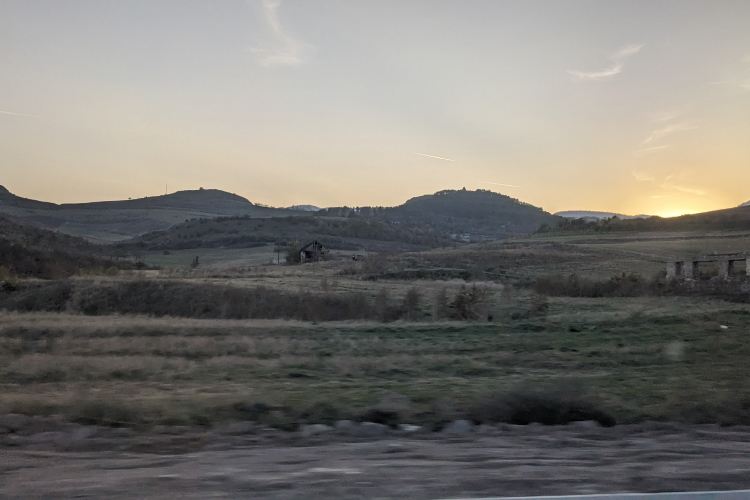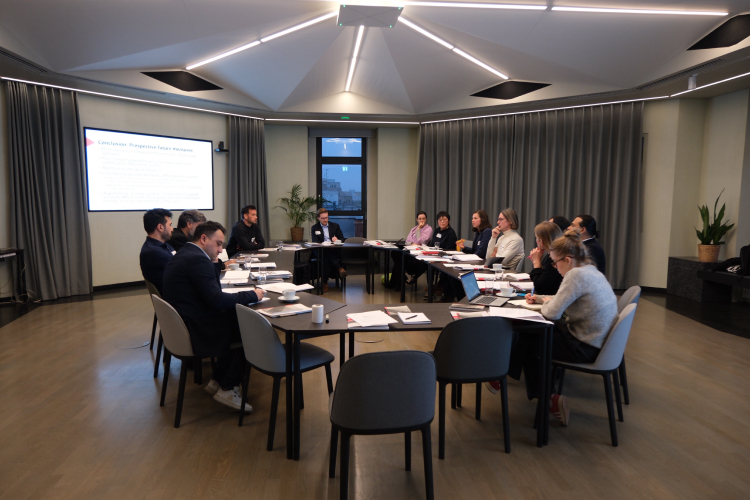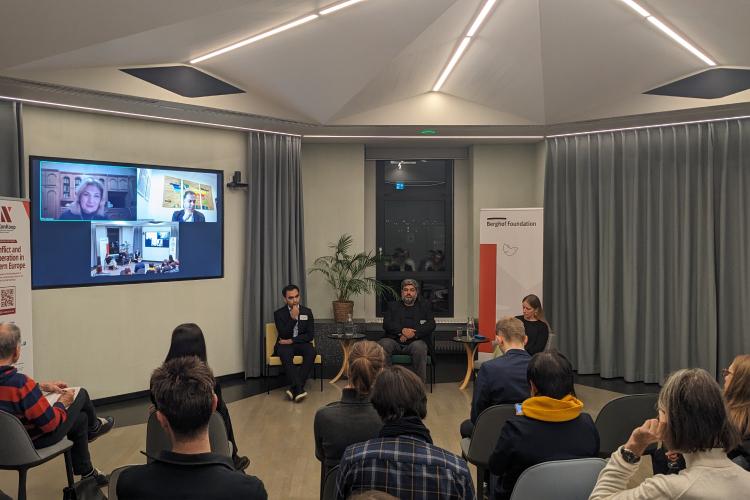
- This event has passed.
CONFERENCE: Building Confidence and Fostering Societal Dialogue: Insights from Armenia and Azerbaijan
November 6, 2024 @ 6:30 pm - 8:00 pm UTC+1

Picture: Border region between Armenia and Azerbaijan (near Kirants, Oct. 2023, photo by Nadja Douglas
Building confidence and fostering societal dialogue
Insights from Armenia and Azerbaijan
6 November 2024 – 18:30 CET
The decades-long conflict between Armenia and Azerbaijan has deeply impacted both countries. Thousands of lives have been lost, many were displaced, and people carry deep hostilities against “the other side”. While there have been intermittent negotiations and efforts to build peace facilitated by international mediators, these processes have struggled to address the deeply rooted mistrust between the populations of both countries.
Building confidence and enabling dialogue between and within Armenia and Azerbaijan is essential to address historical grievances, re-build trust, and foster reconciliation. In the last three decades, civil society organisations in both countries have increased their efforts to address these issues through dialogue at both the political and societal levels. However, the sustainability of these initiatives remains fragile. Without comprehensive confidence-building measures and deeper societal engagement, peace efforts risk being short-lived or limited to elite-level agreements in the future. At our event, international experts will show how confidence-building efforts and inter- and intra-societal dialogues can bridge divides, cultivate a shared understanding, and support the region’s transition from a state of conflict to one of peaceful coexistence. During the event, we will discuss how bottom-up approaches can help Armenians and Azerbaijanis overcome past trauma, establish trust, and create the conditions necessary for long-term peace.
This hybrid event will be held in English. It will take place online via Zoom and at the Berghof Foundation, Lindenstrasse 34, 10969 Berlin.
This event was co-organised by the Berghof Foundation, ZOIS, and KonKoop. MORE INFORMATION
Report:
The workshop was organised by the ZOiS Caucasus Network (funded by the KonKoop research network as part of a project on conflict transformation in regional conflicts) and the Berghof Foundation. It consisted of an afternoon closed session that brought together regional and international experts on the South Caucasus to discuss concrete case studies of conflict transformation from local context(s) and a hybrid panel discussion at the premises of the Berghof Foundation. The evening public panel discussion revolved around the question how to build confidence between societies and prepare societies internally for peace. It was well attended by experts, students, and an interested general public. The public session counted 108 online participants and approximately 35 visitors in the audience.
Closed Session “Grassroots engagement in restoring peace through dialogue and confidence building”
The closed session was opened by ZOiS and Berghof organisers. Four short contributions provided a basis for a constructive discussion, chaired by Tsypylma Darieva (ZOiS). The first speaker, Sebastian Relitz from the NGO “Corridors”, addressed challenges for peacebuilding in the South Caucasus both on the broader societal (dealing with self-isolation and societal traumas) and the civil society level (weak social embeddedness, small peacebuilding community, shrinking space for activities). He concluded by presenting concrete examples of formal peacebuilding education projects conducted by “Corridors” in the region. Bakhtiyar Aslanov from Berghof Foundation continued by laying an emphasis on the perception of peacebuilding activities in the respective societies (Armenia and Azerbaijan) and the impact on regional minorities. He provided insights into the work of civil society as well as external arbitrators and problematized conflicting interests related to their work. He finished by drawing attention to various oral history projects on the ground conducted by Berghof as inclusive processes (involving war veterans, displaced people etc.).
The third speaker, Nadja Douglas from ZOiS, spoke about confidence-building processes on the ground as a means of conflict transformation. She presented recent findings from a KonKoop project, in which she engaged in a mapping and evaluation confidence building measures (CBM) between Armenia and Azerbaijan on the track 2 and 1.5 levels. She pointed out the importance of covariation between international and regional level/events in the context of CBM. She concluded by drawing lessons from past initiatives for future CBMs. The last speaker, Vadim Romashov from Tampere University/Finland, presented insights from the field of critical peace research. He investigated practices of “everyday peace” and coexistence in local communities of Armenians and Azerbaijani in rural areas of Georgia. He found that communal narratives help those communities to achieve a form of “living together with differences”. He finally underlined the need to concentrate on “spaces” and less on “actors” and “institutions” in the context of “peace-supporting” activities. The ensuing discussion revolved around grassroots engagement and track 2 initiatives/ dialogue formats to build trust between conflicting parties, making them more susceptible towards peace.
Notably, the participants discussed key lessons from past CBMs, addressed the issues of fears and disillusionment in the respective societies, potential avenues for grassroots actors to become more involved in confidence and peace-building processes and ultimately the important role of certain target groups of these initiatives, such as borderland communities, younger generations and key multipliers. Highlighting local communities as agents of peace, tolerance and coexistence, the participants agreed that it is not the issue of “building peace, but rather supporting peace”. Tangible spaces of peace and local culture of cooperation and co-existence are in need of support, rather than (international= NGOs and state institutions.

Picture: Closed Workshop © Berghof Foundation, Berlin, 6.11.2024
Hybrid event “Building confidence and fostering societal dialogue. Insights from Armenia and Azerbaijan”
The hybrid panel discussion, moderated by Janel Galvanek (Berghof Foundation) brought together renowned peace activists/researchers from Armenia and Azerbaijan (Mikayel Zolyan from Armenia and Shujaat Akhmazada from Azerbaijan in person, Leyla Alieva from Azerbaijan/UK and Philip Gamaghelyan from Armenia/US via Zoom). They discussed how the needs within respective societies have changed over the years, in particular since the 2020 war and September 2023. The prerequisites for and aims of a prospective peace agreement have evolved accordingly. The changing threat situation, it was argued, represents a decisive factor today: Outside forces are much more powerful today in exercising influence on the regional situation, manipulating conflict narratives, and using the conflict parties Armenia and Azerbaijan for external vested interests. There was a consensus that societal moods remain ambivalent, but there was a general fatigue in view of renewed hostile activities and war. The absence of a formal peace process today has also revealed the weaknesses of the former liberal peace agenda pursued by external mediators, such as the OSCE Minsk Group. There is now a new focus on intra-societal peacebuilding within both Armenia and Azerbaijan, but the societies are advancing, if at all, slowly. In general, it was underlined, that the peace potential in societies is higher than commonly expected. The tenor of the experts was that there is a need to further invest in critical education projects and knowledge production on the ground to eventually create a common regional vision of conflict transformation.

Picture: Public panel discussion with Shujaat Akhmazada (Azerbaijan), Mikayel Zolyan (Armenia), Janel Galvanek (Berghof Foundation); and, via zoom, Leyla Alieva (Azerbaijan/UK) and Philip Gamaghelyan (Armenia/US) © Berghof Foundation, Berlin, 6.11.2024
